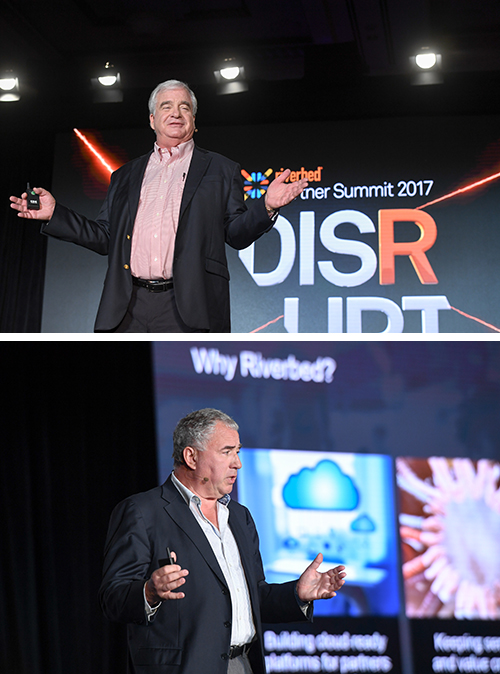Riverbed's Push to the Cloud Is Both Buy and Build
Acquisitions and organic product development will both be part of the strategic mix as Riverbed Technology seeks to grow beyond its WAN optimization roots into a future in the software-defined era.
"We've done three acquisitions in the last 18 months, and we'll continue to do more," said Chairman and CEO Jerry M. Kennelly on Wednesday in a keynote at the Riverbed Partner Summit 2017 in Santa Barbara, Calif.
Kennelly's comments came as he and other senior executives were explaining the company's newly heavy emphasis on cloud and urging the 160 partners in attendance to commit to joining Riverbed in focusing on cloud networking, digital experience monitoring and service lifecycle management.
Riverbed used the conference to highlight its pivot from a business and partner model focused on fulfillment of Steelhead WAN optimization appliances to solutions that are more dependent on services leveraging newer products like SteelConnect for cloud networking and software-defined-WAN and SteelCentral for application and network performance monitoring.
"We are...a different company than we were two years ago, and so much of this comes from our commitment to the cloud," said Karl Meulema, senior vice president of Worldwide Channels at Riverbed, from the stage at a conference themed "Disrupt."
 Riverbed CEO Jerry Kennelly (top) says to expect more acquisitions, while SVP of Channels Karl Meulema says the forthcoming Service Delivery Platform is Riverbed's biggest internal bet. (Source: Riverbed Technology.)
Riverbed CEO Jerry Kennelly (top) says to expect more acquisitions, while SVP of Channels Karl Meulema says the forthcoming Service Delivery Platform is Riverbed's biggest internal bet. (Source: Riverbed Technology.)
Kennelly did not indicate what technology sectors Riverbed is looking at for future acquisitions, but the three acquisitions he referred to -- Xirrus in April, Aternity last July and Ocedo last January -- all brought important components that are fitting into the San Francisco-based company's evolving strategy.
Last week, Riverbed unveiled its definitive agreement to acquire Xirrus, a provider of high-density Wi-Fi solutions that are known for serving up connectivity at high-profile sporting events and large-scale conferences. More important for Riverbed and its partners is Xirrus' technology for managing Wi-Fi networks from the cloud, which is critical for the company's cloud networking ambitions.
Several Riverbed executives described Xirrus on stage as a Cisco Meraki killer for Riverbed and its partners. Meulema spelled out the thinking in a one-on-one interview Wednesday. "Xirrus fills a hole for those customers who are looking to integrate LAN and WAN from the same point. Our SD-WAN offering was well accepted by our customers and our partners, but Meraki had an edge and we've taken that edge away," he said.
The Aternity acquisition from last July filled an important piece of Riverbed's digital experience monitoring puzzle, according to Mike Sargent, senior vice president and general manager of the SteelCentral business unit at Riverbed.
"The CIO is more blind than ever. They have all the accountability and less and less of the control," Sargent said of the need for visibility across the network, applications code, servers and public cloud services for diagnosing and fixing problems with networks and mission-critical applications. "You can't manage what you can't see."
Aternity added to the solution by bringing end-user devices into the SteelCentral monitoring picture. "It gave us that broad net to really see what's going on," Sargent said.
The Ocedo acquisition, meanwhile, was "absolutely instrumental" to Riverbed's SD-WAN play, Meulema said. "We recognized that we were behind on the controller side. It just gave us that one year or more jump in time," he said.
At the same time, Riverbed has placed internal investment bets in several areas. The company launched SteelConnect into the SD-WAN market a year ago and revved it with a 2.0 version in September. Along the way, the product has brought what Riverbed calls "one-click" connectivity first for Amazon Web Services and later for Microsoft Azure.
According to Meulema, the company's biggest organic investment is a project under development called the Service Delivery Platform (SDP).
During the conference keynote, Phil Harris, who runs Riverbed's service provider business, described the SDP as an effort to help Riverbed partners bring the speed of the software industry and the service repeatability of the managed service provider (MSP) market to the business of spinning up infrastructure and application service lines through a platform that leverages Riverbed's existing technology and combines it with APIs, templates and consumption analysis tools. The platform is being designed to be multi-tenant and capable of orchestrating elements from multiple vendors and services, not just Riverbed gear and software.
"In the same metaphor that the software industry has moved to a DevOps model, which is all around those ideas of continuous integration, continuous development, continuous release, much more accelerated value for the cloud, why can't we bring that value to the overall IT market space?" Harris said. He said the first version of the platform will be available in the third quarter.
Amid all the product change, Riverbed has been whittling its channel down from about 2,700 partners a few years ago to under 1,000 today in an effort to engage more deeply with partners who can help with the partner-led service strategy.
"Their focus on services and enabling and motivating their partners to strengthen and develop their own partner-branded services is absolutely the right thing to be doing," said Kevin Rhone, an analyst with Enterprise Strategy Group who attended the conference. "It's not easy helping partners transform their business models. I think they'll end up with a somewhat smaller but stronger partner network because not all of their traditional reselling partners will be able to develop a deep consultative service business."
Posted by Scott Bekker on April 28, 2017